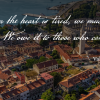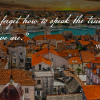
Published: March 31, 2000
View the Original Newsletter: Iskra-55.pdf
About This Issue
Iskra No. 55 captures a defining moment in Croatia’s postwar evolution — when national identity, politics, and diaspora relationships collide with shifting global realities. From controversial revelations about the Tuđman–Milošević telephone line to the closure of the Office for Immigration, the issue gives voice to concern, loyalty, and defiance within the Croatian community.
At its heart, this edition highlights the deep emotional connection between Croats abroad and their homeland — a connection tested by politics but fortified through culture, education, and community action.
Editorial: “The Changing Winds of Croatia”
In her opening column, Valentina Krčmar reflects on the uncertainty that grips Croatia under new leadership. Banks are failing, institutions are dissolving, and long-held alliances are being questioned. Yet amid the confusion, she celebrates signs of resilience — the dedication of language professors at the University of Toronto, the vibrancy of local folklore groups, and the enduring importance of open dialogue in the pages of Iskra.
“It is important that everyone has the right to their opinion — to speak, to write, and to do so with respect. Only through this can we remain united, even when we disagree.”
Her tone blends realism and encouragement, urging readers to write, debate, and stay connected to one another and to Croatia.
Feature: The Tuđman–Milošević Phone Line Revelation
A bombshell report confirms the existence of a direct, encrypted telephone line between former Croatian President Franjo Tuđman and Slobodan Milošević — a secret that shocks the nation and raises questions about the depth of their wartime communications.
Current President Stjepan Mesić publicly confirms the discovery, revealing that the device, found at the Presidential Palace, had been used for years, though the access card enabling calls was missing.
Reactions range from disbelief to outrage. Former officials like Hrvoje Šarinić deny any knowledge of the line, while others, including Stjepan Kljuić, affirm its existence and recall coordinated contacts between Zagreb and Belgrade during the war.
The article paints a complex picture of wartime diplomacy — a reminder that the search for truth is often more unsettling than the myths that precede it.
Motrišta: “If You Don’t Do Politics — Politics Will Do You”
In a striking opinion essay, Drago Geoheli shares a letter from a returnee to Croatia, disillusioned by the dismantling of diaspora institutions and growing hostility toward Croats abroad.
“We have become unwanted persons — personae non gratae — in the country we helped rebuild.”
Geoheli warns that the new government’s actions risk alienating the diaspora that once fueled Croatia’s independence movement. He argues passionately that Croats abroad must remain engaged, organized, and united — comparing their role to that of the global Jewish community in preserving Israel’s survival.
“Without our diaspora, there would be no independent Croatia.”
The piece resonates as both a critique and a call to arms — a reminder that identity, sacrifice, and belonging must never be taken for granted
Iskra-55
.
Community Highlights
Folklore and Cultural Pride
The Croatian Folklore Ensemble “Hrvatska” (Mississauga) hosts a dazzling spring concert, showcasing children, youth, and senior dancers performing traditional pieces from Draganić, Krk, and Međimurje. The event culminates with a heartfelt presentation of a portrait painted by Professor Ilija Vranešić for Father Kecerin, honoring decades of cultural leadership and mentorship.
“It was more than a concert — it was a celebration of everything that keeps our hearts Croatian.”
Wine & Cheese Reception – Supporting the Croatian Language at U of T
The Canadian-Croatian Congress organizes a fundraising reception for the University of Toronto’s Croatian language program, attended by Consul Ivan Picukarić, Professor Silvana Sanader, and many community leaders. Valentina notes the disappointing turnout but praises those who attended, emphasizing that education and cultural preservation begin with community involvement.
Cro-Sport 2000 Grand Opening
A new community hub at 89 Queen Street South, Streetsville opens its doors — a milestone for the Croatian-Canadian community, symbolizing cooperation and forward vision.
Health Column: “Antibiotics — Powerful but Not for Everything”
Dr. Darko Desaty provides an in-depth guide to the safe and responsible use of antibiotics. He warns against misuse for viral illnesses and explains the growing danger of antibiotic resistance. His clear, practical advice reinforces one of Iskra’s core missions: empowering readers through knowledge and health awareness.
Letters to the Editor: “Wake Up, Community!”
In a moving open letter, Biserka Milinković from Oakville responds to recent columns urging self-reflection among Croats in Canada. She laments apathy, insularity, and the lack of youth engagement in cultural and civic life.
“We have fallen asleep. Instead of growing spiritually and culturally, too many are content just to eat, drink, and be entertained.”
Her letter is a call to action — to volunteer, to educate children, to support Croatian publications, and to take pride in belonging to both Canada and Croatia.
Poetry: “Golubica Vukovarska” (The Dove of Vukovar)
Poet Vinko Zlomislić delivers a haunting lyrical tribute to Vukovar’s fallen heroes. Through the voice of a mourning dove, the poem recalls the city’s devastation and eternal yearning for its lost sons.
“Golubica guče nad Dunavom — the dove coos above the Danube — calling her children home.”
Closing Reflection
Iskra No. 55 stands as both a chronicle and a mirror — reflecting the political turbulence in Croatia and the ongoing determination of its diaspora. Between the headlines and heartfelt letters, one truth endures: unity, culture, and conscience remain the lifeblood of the Croatian spirit.
“We must not let distance or politics divide us. Our love for Croatia is what still connects us — across oceans, generations, and time.”




